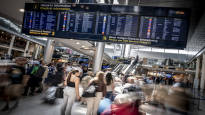The amount of the flight tax is on average about 100 Danish kroner, i.e. a little over 13 euros per flight.
Denmark introduces flight tax.
The matter was decided today, Friday, by the Danish governing parties together with the two red-green opposition parties, says the Danish broadcasting company DR.
– This is a really good agreement that strengthens green development in the aviation sector, which causes far too many carbon dioxide emissions, the Danish Minister of Taxation Jeppe Bruus rejoiced for DR.
The flight tax will be introduced gradually by 2030. The amount of the tax depends on the flight distances.
For flights within Europe, Danes have to pay an additional tax of 50 Danish crowns, or just under 7 euros. On the longest long-haul flights, for example to Asia and Australia, the tax rises to around 55 euros.
On average, the tax is slightly more than 13 euros per flight.
In the past, the governing parties had a negative attitude towards the introduction of the flight tax or proposed a significantly lower tax. The change of opinion may have been influenced by the fact that the majority of Danes are According to DR in favor of air tax.
Effects on climate emissions unclear
Part of the funds collected through flight taxes is supposed to be directed to the development of green fuels.
However, the lion’s share of the tax funds is used for pension increases.
In 2030, the flight tax is expected to generate 1.2 billion kroner, or about 160 million euros, half of which is to be used to increase pensions.
The parties also agreed that in 2025 Denmark will introduce the first domestic “green” flight route, i.e. a flight connection that causes less climate emissions. In 2030, all flights within Denmark should run on biofuels.
According to the Danish government, the agreed subsidies for the development of green fuels would cut the country’s carbon dioxide emissions by 100,000 tons.
Dr tells however, that one of Denmark’s leading biofuel researchers, a professor at Aarhus University Jannick Schmidt disagrees with the emission effects. According to Schmidt, there are no climate benefits from using “green” biofuels for flying.
The Danish government has not calculated the climate effects of the flight tax itself. However, the Danish green think tank Concito has calculated that the introduction of the flight tax would reduce aviation emissions by four percent, or 200,000 tons of carbon dioxide in Denmark.
Flight tax is becoming more common in Europe
Denmark is already the third Nordic country to start taxing air passengers. Sweden and Norway have already introduced the tax.
Air passengers are also taxed in the Netherlands, Germany, France and England, among others.
In Finland, an air tax has been demanded by citizens’ initiative, but the parliament rejected the citizens’ initiative last year.
